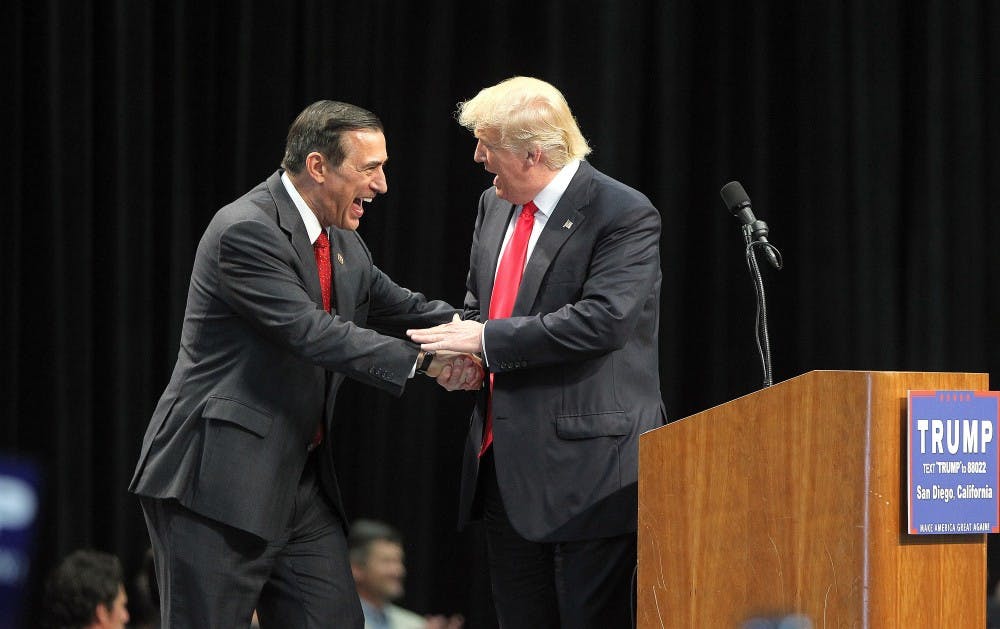Professor: Branch wins like ‘Christmas for Republicans’

In the wake of Donald Trump being elected the next President of the United States of America, many Americans took to social media to debate the possibilities of policies Trump had championed throughout his campaign.
The verdict is still out on what is and isn’t possible.
David Jesuit, chairperson of the department of political science, said some Trump policies stand no chance of becoming reality. He referenced the mass deportation Muslim-practicing Americans as an “impossible” feat.
The fact the House, Senate and Executive Branch are all Republican however will make it “very easy” for Republican-based policies to be enacted, Jesuit said. He added that tax cuts or the potential privatization of social security could be some of the first things Republicans might work to pass come January.
“It’s going to be Christmas for Republicans,” Jesuit said. “They will have the opportunity to enact their policy agendas that they’ve been talking about for years.”
Since being elected, the Trump campaign has removed the anti-Muslim platform point from its website. However he still plans to keep good on his mass deportation of illegial immigrants policy.
In an NPR article posted Sunday night, a preview of Trump’s interview on the news television show “60 Minutes,” which aired that same night, said Trump was in favor of “deporting 2-3 million people” once in office.
Other policies, however, such as Trump’s Mexico-funded border wall to end illegal immigration may not be as farfetched as some might think. The way he’s presented the idea isn’t feasible, Jesuit said, but Trump might be able to do something of a similar nature.
Jesuit said he wouldn’t be surprised if Trump claims the wall will be a success, without it fully being realized as the idea he campaigned on.
“Some of his supporters have it in their heads he’s really going to build this wall and it’s going to be beautiful — no,” Jesuit said. “What will likely happen is he’ll get some money to extend the fence already in place. Maybe there’ll be some money directed toward increased electronic surveillance, and he’s likely to get that (money). But he’ll add to the wall that’s already there and then claim it as a victory.”
Some of Trump’s other platform points will need help being realized from the Supreme Court.
The court, made up of nine justices, is evenly split with four conservatives and four liberals since the passing of conservative Justice Antonin Scalia. Since Feb. 13, his seat has remained vacant. All attempts to fill the hole by President Barack Obama have been blocked by the House and Senate.
If a Justice isn’t chosen by the time Obama leaves office, it will be up to Trump to choose a nominee. His choice will likely be conservative, following a trend of filling Supreme Court holes with a justice whose political leanings match those nominated before them.
But it might not just be Scalia’s seat Trump will have to fill.
Justices are only removed from the Supreme Court if they are impeached, step down or die. Because of this, Jesuit said the ages of Justices Ruth Bader Ginsburg at 83, Anthony Kennedy at 80 and Stephen Breyer at 78 make them the oldest Justices on the Court. It also makes them the most likely candidates to potentially be replaced in the next four years.
Potentially losing two liberal Supreme Court justices in Ginsburg and Kennedy could create a seven-and-two court and set a conservative tone in American law for the next several decades.
This could put past Supreme Court decisions in landmark cases such as Roe v. Wade (1973), which granted the right to an abortion, or Obergefell v. Hodges (2015), which granted same-sex couples the right to marriage, up in the air.
“Could Trump overturn those laws on his own? No,” Jesuit said. “But, could he appoint Justices that would do that? Absolutely. If (Trump) were to appoint someone who was as conservative as Scalia (to fill his seat), it becomes a conservative court, and (the Court) could overturn something like Roe v. Wade right there. If he locks (a conservative court) in, that will have an effect for generations.”



